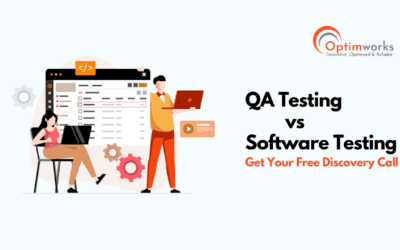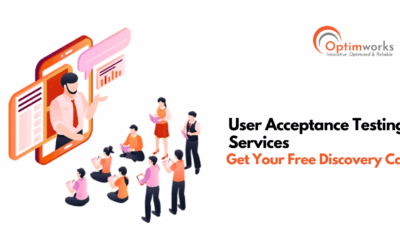Introduction: Why iOS App Testing Services Are Critical
In the iOS ecosystem, perfection isn’t optional — it’s expected. Apple users value polished performance, seamless navigation, and zero crashes. Yet, even the most innovative apps can fail if not tested rigorously across devices, iOS versions, and network conditions.
From App Store rejections to one-star reviews, the cost of skipping proper iOS testing is steep. That’s why iOS app testing services play a vital role in ensuring your app performs flawlessly, every time.
At Optimworks, we help businesses validate functionality, security, and user experience across the iPhone, iPad, and Apple Watch ecosystem. Our iOS testing experts simulate real-world user conditions, uncover hidden defects, and ensure your app meets Apple’s stringent quality benchmarks before it reaches users — giving your business a head start on performance, reliability, and trust.
What Does iOS App Testing Cover?
iOS app testing goes beyond simply verifying if an app launches correctly. It ensures every feature, interaction, and workflow works seamlessly under real-world conditions.
Key Testing Areas:
- Functional Testing: Validates that each feature — login, payments, push notifications — performs as intended.
- Performance Testing: Measures app responsiveness, load handling, battery consumption, and memory usage under stress.
- Compatibility Testing: Confirms the app works across iPhone and iPad models, different iOS versions, and screen resolutions.
- UI/UX Testing: Ensures navigation is intuitive, buttons respond correctly, and the design aligns with Apple Human Interface Guidelines.
- Security Testing: Protects sensitive user data with encryption checks, secure authentication, and privacy compliance.
- Regression Testing: Confirms that new features or updates don’t break existing functionality.
Optimworks combines manual and AI-powered automated testing to cover all these areas efficiently. Our approach simulates real-world usage, identifies hidden defects, and ensures your app is robust, compliant, and ready for App Store submission — reducing risk and improving user satisfaction from the first launch.
Key Phases of iOS App Testing Services
Effective iOS app testing services follow a structured, end-to-end approach to ensure app quality, performance, and user satisfaction. Optimworks implements the following key phases:
- Planning & Requirement Analysis
Understanding business objectives and app functionality is the first step. Optimworks’ QA teams collaborate with stakeholders to define test scope, identify critical workflows, and set quality benchmarks aligned with Apple’s standards.
- Test Design & Environment Setup
Test scenarios are created for functional, performance, security, and UI/UX validation. Real devices, emulators, and multiple iOS versions are configured to replicate real-world conditions.
- Test Execution
Manual and automated tests run across various devices and networks. Functional testing ensures features work, while performance tests evaluate responsiveness, battery consumption, and memory usage. Regression tests confirm that new updates do not break existing functionality.
- Security & Compliance Checks
Optimworks validates encryption, secure authentication, and compliance with Apple guidelines and industry regulations like GDPR, PCI-DSS, or HIPAA.
- Reporting & Continuous Feedback
Comprehensive test reports highlight defects, performance bottlenecks, and UX issues. Feedback loops enable rapid corrective action, ensuring the app is production-ready.
By following these phases, Optimworks delivers robust, reliable, and user-ready iOS apps, minimizing risks and maximizing business impact.
Tools & Frameworks for iOS Testing
Optimworks leverages industry-leading tools and frameworks to deliver comprehensive iOS app testing services, combining manual expertise with AI-driven automation. Using the right tools ensures thorough validation across devices, OS versions, and user scenarios.
Popular iOS Testing Tools:
- XCUITest: Apple’s native automation framework for UI and functional testing, fully integrated with Xcode.
- Appium: Cross-platform automation for iOS and Android, ideal for regression and repetitive test cases.
- Cypress & Selenium: Web-based testing for hybrid apps, validating UI consistency across webviews.
- TestFlight: Enables beta testing with real users, gathering feedback before production release.
- Crashlytics & Firebase: Tracks crashes, errors, and performance metrics in real-time.
- BrowserStack & LambdaTest: Cloud-based device farms for testing across multiple iOS devices without maintaining physical labs.
CI/CD & Automation Integration
Optimworks embeds testing into CI/CD pipelines using tools like Jenkins, GitLab, and GitHub Actions. Automated triggers run regression and functional tests whenever new code is pushed, ensuring continuous quality assurance.
By combining these tools with domain-aware expertise, Optimworks delivers iOS apps that are fast, secure, compliant, and user-friendly, reducing post-launch issues and accelerating time-to-market.
Best Practices & Common Pitfalls
Delivering high-quality iOS apps requires a disciplined testing approach. Optimworks follows industry best practices to maximize efficiency and minimize risks while avoiding common pitfalls.
Best Practices:
- Prioritize Real Devices: Testing on actual iPhones and iPads ensures realistic performance and UX insights.
- Automate Where It Adds Value: Use AI-powered automation for repetitive functional and regression tests to accelerate releases.
- Comprehensive Coverage: Include functional, UI/UX, performance, security, and compatibility tests across OS versions.
- CI/CD Integration: Embed testing in pipelines to catch defects early and reduce production issues.
- User-Centric Scenarios: Simulate real user workflows to validate business-critical functions.
Common Pitfalls to Avoid:
- Relying solely on simulators and ignoring device fragmentation.
- Neglecting older iOS versions or screen sizes.
- Skipping security and compliance validations.
- Poorly maintained automated test suites causing flaky results.
- Failing to test under real-world network and battery conditions.
By following these practices, Optimworks ensures robust, reliable, and user-approved iOS apps that meet both business and technical expectations.
Business Benefits & ROI
Investing in iOS app testing services is more than a technical requirement—it’s a strategic decision that drives measurable business value. Functional and performance testing, combined with robust regression checks, ensures your app delivers seamless user experiences, reducing errors, crashes, and negative reviews.
For businesses, the benefits are clear: faster releases, improved user satisfaction, and fewer costly post-launch fixes. A well-tested app translates to higher App Store ratings, better retention, and increased revenue. In eCommerce, for example, functional testing guarantees smooth checkout, while regression testing ensures that new features do not disrupt existing payment flows, protecting both revenue and brand reputation.
Optimworks enhances ROI by leveraging AI-driven automation, real-device testing, and CI/CD integration. This reduces manual effort, accelerates release cycles, and ensures consistent quality across multiple iOS devices and versions.
By combining technical rigor with business-focused testing strategies, Optimworks ensures your iOS applications are reliable, compliant, and user-ready, turning QA into a growth enabler rather than just a cost center.
How Optimworks Excels in iOS App Testing
Optimworks stands out in delivering iOS app testing services by combining domain expertise, advanced automation, and comprehensive quality assurance frameworks. Our approach ensures that apps not only function correctly but also deliver superior performance, security, and user experience across the iOS ecosystem.
Domain-Aware Expertise
With experience across BFSI, healthcare, eCommerce, and SaaS, Optimworks understands industry-specific requirements. Our QA engineers ensure apps comply with regulatory standards like GDPR, HIPAA, and PCI-DSS while validating business-critical workflows.
End-to-End Testing Coverage
Optimworks offers a structured testing framework covering functional validation, UI/UX, performance, compatibility, security, and regression. Whether it’s unit-level testing or high-volume stress scenarios, we ensure apps remain stable across multiple devices and iOS versions.
AI-Powered Test Automation
By integrating AI-driven automation, we reduce manual effort, accelerate test execution, and maintain consistent accuracy. Our automated scripts adapt to evolving app features, making regression and functional testing faster and more reliable.
Continuous Monitoring & CI/CD Integration
Testing is embedded into your CI/CD pipelines with continuous monitoring dashboards to track performance, detect anomalies, and flag regression issues in real-time.
Measurable ROI with Risk-Free Pilots
Optimworks offers risk-free pilots to demonstrate our iOS testing capabilities. Enterprises can validate our approach on live apps, seeing tangible improvements in performance, reliability, and release velocity before scaling.
Case Study for iOS App
A leading eCommerce company approached Optimworks with a critical challenge: frequent crashes and inconsistent performance across iPhone and iPad models, resulting in poor user reviews and lost revenue. The client needed end-to-end iOS app testing services to stabilize their app before a major sales event.
Our Approach:
- Requirement Analysis: We identified high-risk workflows, including checkout, payment, and push notifications.
- Real Device Testing: Tests were conducted on multiple iOS versions and device models to replicate real-world usage.
- AI-Powered Automation: Repetitive functional and regression tests were automated to accelerate test cycles.
- Performance & Security Checks: Evaluated app responsiveness, memory consumption, battery usage, and secure data handling.
- Continuous Monitoring: Integrated CI/CD pipelines to track ongoing performance and regression results.
Results:
- 40% faster release cycles
- 85% reduction in post-launch defects
- Improved App Store ratings from 3.8 to 4.7
- Seamless user experience across all iOS devices
With Optimworks, the client achieved a robust, reliable, and high-performing iOS app, ready for global deployment.
Conclusion
Delivering a flawless iOS app is no longer optional—it’s essential for user retention, revenue growth, and brand trust. Both functional and regression testing are critical components of a comprehensive iOS app testing services strategy. Functional testing ensures new features work flawlessly, while regression testing safeguards existing functionalities, providing a seamless and reliable user experience.
At Optimworks, we combine domain expertise, AI-powered automation, real-device testing, and CI/CD integration to deliver end-to-end iOS testing solutions. Our structured approach identifies defects early, accelerates release cycles, and ensures compliance with industry standards, transforming QA from a cost center into a business enabler.
Ready to elevate your iOS app quality? Partner with Optimworks to leverage our risk-free pilot program and experience faster releases, superior performance, and higher user satisfaction from day one.




